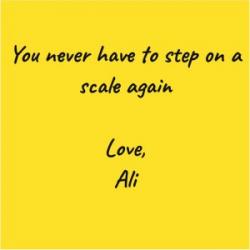
Trigger Warning: Eating disorder behaviors, weight talk (no numbers)
How I Gave Myself Permission to Never Step on a Scale Again
Life-changing moments rarely materialize in an instant. They are often predicated by dozens of seemingly inconsequential moments or even other potentially life-changing revelations. To indeed be life-changing, a revelation must be put into action.
I’ve experienced many life-changing revelations. Some I put into action right away, while others faded into the background. The revelations that faded didn’t disappear, rather they took a step back and waited for a catalyst.
Giving myself permission to never step on a scale again changed the course of my life forever. As Lin Manuel Miranda would say, “It was a bit of a day.” That day, that decision, that moment helped lead me to where I am today. Recovered.
That moment did not happen in a vacuum. There were many moments that led me there. That’s the thing about recovery work, we often can’t see how the little moments, the seemingly inconsequential decisions, lead to big change. That’s why patience is a key component of recovery.
THE MOMENT occurred on March 17, 2015. But I must start with what happened the day before. On March 16, 2015, I did something I’d done off and on for over thirty years, I binged and purged. After the fleeting numbness passed and the shame set it, I berated myself up for doing something so destructive and harmful. I belittled myself for being so stupid and out of control. As I curled up in a fetal position on our family room couch, I told myself if I didn’t stop using those behaviors, the eating disorder would kill me.
“The eating disorder will kill me.”
“This eating disorder is killing me.”
“I am letting this eating disorder kill me.”
“The eating disorder is killing me and I am letting it.”
Rather than seek another escape from the pain, I let myself feel the heaviness of those thoughts. Through the pain I acknowledged that for the last fifteen years, especially since the birth of our first child in 2010, before every purge I wondered, “Is this the time it’s going to kill me?” And then did it anyway. I was so desperate for a momentary escape from the pain and suffering, I was willing to risk not seeing my kids grow up. I was willing to risk leaving my husband. I was willing to risk my life.
As devastating as those realizations were, I am eternally grateful I allowed myself, the Ali I barely knew, to feel them. Because when I sat there confronted with the fact that this disease would kill me and that for years I was willing to let it, I began to feel something deep and primal:
I didn’t want to die. But even more than that, I wanted to live.
It was a life-changing realization. And it mattered. But not as much as what I did next. I knew I couldn’t continue to do what I’d always done after a binge and purge episode; beat myself up and then try to convince myself, “I’m going to get my shit together tomorrow.” If I did, the next day I’d start a new restrictive eating plan, a new workout regimen and fantasize about how amazing my life would be when I lost weight, got control over food and looked perfect.
In over thirty-years of fantasizing and trying, that never happened. Ever.
I had to do something different. So I gave myself permission to rest for the remainder of the day. I acknowledged that I had just done something violent to my body and needed to take care of it. I didn’t beat myself up anymore. I rested. I didn’t talk about what happened or the realization I’d made. I let the notion that I was going to do things differently this time percolate while I cuddled with the boys, ate dinner and went to sleep. (Steve was out-of-town)
The next morning, I got up, made breakfast for the boys and I, got dressed, got the boys dressed, took the boys to the park, came home and ate lunch. After nourishing my body and mind with lunch, I turned to the magical superpowers of television to keep my two and four-year old transfixed for a couple of hours while I searched for something I wasn’t sure existed:
A road to Recovered.
I knew Recovered was possible but I’d never seen or heard of someone like me being Recovered. My story, my identities and the lenses through which I saw the world seemed so different then the people I read about in recovery books or saw online. Most readily accessible recovery books focused on anorexia and featured young, white, thin women who struggled with eating disorder thoughts and behaviors for a few years. As a middle-aged women in a medium-sized boy who struggled with an eating disorder for over thirty-years, I struggled to see parts of myself their stories. Make no mistake, their stories matter. And so does mine.
As I clicked around the internet, I was disheartened by the amount of people in “eating disorder recovery” selling and/or promoting weight-loss centric routes to Recovered. I’d tried their products and followed their blogs and Facebook pages for years, and rarely felt anything other than shame. I certainly never got anywhere near Recovered. Those mechanisms kept my attention and energy focused on food, my body and my weight which was completely antithetical to recovery. I ignored those pages and kept scrolling.
After navigating through one or two more internet rabbit holes, I stumbled upon a book called 8 Keys to Recovery From an Eating Disorder by Carolyn Costin and Gwen Schubert Grabb. The title intrigued me (how could it only take 8 keys to deal with something that plagued me for over thirty years?) so I downloaded a sample of the book on my i-phone.
In the Introduction, Carolyn and Gwen wrote about their eating disorder histories. Both had anorexia which made me feel a bit alienated as bulimia and binge eating were my primary crucibles. But I kept reading because the language they used felt safe and weight-neutral. At the end of the Introduction there was a Writing Assignment detailing the importance of journaling.
It caught my eye and interest because I’d recently (read: January 1, 2015) set, and thus far kept, a New Year’s Resolution to journal everyday (it was the first time in over three decades I set a resolution that didn’t involve shrinking the size of my body). As I read about the benefits of journaling, I started to feel something…
Connection…Validation…Inspiration…Hope.
[J]ournaling is one of three things that most of our clients who have [R]ecovered have in common. The other two are not weighing and reaching out for support at the first sign of a problem.
8 Keys To Recovery, pg 9 [Emphasis added].
It was my first tangible glimpse at what Recovered looked like. And Recovered had nothing to do with physical appearance. It had to do with behaviors. Recovered wasn’t a magical fairytale (ie. Everything will be amazing!) It was the result of consistent use of constructive and restorative behaviors.
I suspected it took more than three behaviors to get to Recovered. But that my early, and very fragile, stage of recovery practicing three new behaviors felt more manageable than trying get rid of all my old behaviors and replace them with new ones. And, since I was already journaling regularly (almost daily even) I got to check one behavior off the list! It felt really good to know I was already doing something that would help me create and navigate my road to Recovered.
The notion of not weighing myself took more thought. My first reaction to the idea of never stepping on a scale again wasn’t relief, it was fear. I felt really unsettled, like my body might rage out of control if I didn’t regularly step on a scale to check it. Or that some malady would go undiagnosed because I didn’t know my exact weight. Rather than catastrophize, I sat with the discomfort and processed through those thoughts and feelings.
One of my big fears was the fear of my body raging out of control. What did “raging out of control” mean anyway? As I thought about it, “dramatic” or “drastic” change in body size came up. Did I actually need a scale to tell me my body was changing? I mean if my fear was a “dramatic” or “drastic” change wouldn’t my body give me some clues by signaling distress or discomfort? At the very least, my clothes might be a reliable indicator that my body was changing.
Stepping on the scale only revealed minor, and totally normal, weight fluctuations. A couple of pounds up or down had no real impact on my physical health. Except that knowing the exact numbers caused me to mentally obsess about my weight for hours and/or days later (not to mention the days and hours I spent obsessing before I stepped on the scale. I call this scale trauma. You can read more about it here).
I concluded I didn’t need confirmation of my body’s weight fluctuations. Especially during recovery. I knew my body size might fluctuate a bit during the re-nourishment process as my body learned to adjust to sustained nourishment. I also knew that scale trauma would make it virtually impossible for me to get through that process. The profoundly negative impact of stepping on a scale obliterated any perceived need to track weight fluctuations. This was a big revelation but not enough to make me give up the scale just yet.
Never stepping on a scale again brought up another big fear. What if my doctor missed a big scary diagnosis because she didn’t have my exact weight? As I sat with that question, it dawned on me there wasn’t (still isn’t) a single illness, scary or otherwise, diagnosable by weight alone. Most diagnoses include multiple symptomatology (weight is merely one symptom). And it’s not the weight itself that is the symptom, it’s significant weight loss or weight gain which I can recognize and communicate to my doctor without stepping on a scale.
As I sat there thinking, I realized the commonality between all the scary diagnoses was death. I was afraid that if I didn’t get on a scale regularly, I would have a deadly disease and not know it. Then it hit me. I already had a deadly disease. An eating disorder is the deadliest mental illness in America (one person dies because of an eating disorder every sixty-four minutes). And if I stepped on a scale during recovery, scale trauma would strengthen the eating disorder and hinder my recovery process. Whatever harm I was potentially exposing myself to by not stepping on a scale was far less dangerous than the harm the eating disorder was already inflicting.
For the first time in three decades, I acknowledged that stepping on the scale was far more harmful and life-threatening than not stepping on the scale. And if I wanted a real shot at a full and complete recovery, I had to give myself permission to never step on a scale again.
So I did.
I gave myself permission to never step on a scale again. In that moment, it felt like a burden the size of a MAC truck lifted off my shoulders. I felt relief. I felt hope. I felt empowered. For the first time in my life, I felt like I had the power to cultivate my road to Recovered. I purchased two copies (one digital, one hard copy) of 8 Keys to Recovery From an Eating Disorder and got to work.
Here I am two and a half years later. Recovered. I no longer have eating disorder thoughts, eating disorder behaviors and I accept my body as it is (I even love it).






